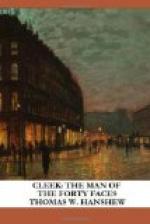Who feeds on Hope alone makes but a sorry banquet; and for the next few weeks Hope was all—or nearly all—that came Cleek’s way.
For some unexplained reason, Miss Lorne’s letters—never very frequent, and always very brief—had, of late been gradually growing briefer: as if written in haste and from a mere sense of duty and at odd moments snatched from the call of more absorbing things; and, finally, there came a dropping off altogether and a week that brought no message from her at all.
The old restlessness, the almost outlived sense of personal injury and rebellion against circumstances, took hold of Cleek again when that time came; and the soul of him drank deep of the waters of bitterness.
So, then, it was all to be in vain, was it, this long struggle with the Devil of Circumstances, this long striving for a Goal? And after all, “Thou shalt not enter” was to be written over the gateway of his ambition? He had been lifted only to be dropped again, redeemed only to let him see how vain it was for the leopard, even though he achieved the impossible and changed his spots, to be other than a leopard always; how impossible it was for a man to override the decrees of Nature or evade the edicts of Providence? That was what it meant, eh?
To a nature such as his, Life was always a picture drawn out of perspective. There was never any Middle Distance; never any proper gradation. It was always either the Highest Heights or the Lowest Depths; the glare of fierce light or the black of deepest darkness. He could not plod; he must either fly or fall; either loll at the Gates of Paradise or groan in the depths of Hell. And the failure of Ailsa Lorne’s letters sent him to the darkest and most hopeless corner of it.
Not that he blamed her—wholly; but that he blamed that Fate which had so persistently dogged him from childhood on. For now that the letters had ceased altogether, he recalled things which otherwise would have been forgotten; and, his sense of proportion being distorted, made mountains out of sand dunes.
In one of those letters, he recollected, she had spoken of meeting unexpectedly an old friend whom she had not seen since the days of his boyhood; in another, she had casually remarked, “I met Captain Morford again to-day and we spent a very pleasant half hour together,” and in a third had written, “The Captain promised to call and take tea to-day but didn’t. I rather fancy he divines the fact that Lady Chepstow does not care for him. Indeed, she dislikes him immensely. Why, I wonder? Personally, I think him exceedingly pleasant, and there are things in his character for which I have the deepest respect and admiration.”
And out of these trifling circumstances—lo! the darkest corner that darkest Hell contained.
So that was how it was to end, was it? That was the card which Fate had all along kept up her sleeve while she stood off laughing at his endeavours, his hopes, his struggles against the inevitable? In the end, another man was to appear, another man was to win her, and the dream was to turn out nothing more than a dream after all.




